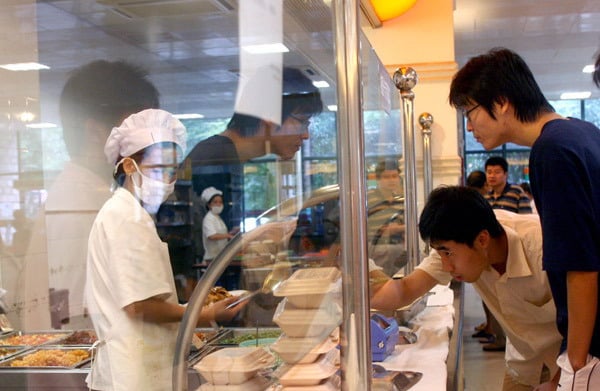It’s a common past time to watch with a little disgust and a little condescension as local students slurp, burp and rush through a bowl mixed of rice, meat, vegetable and oil at the Peking University canteens. After almost a semester spent here studying with them, I’ve come to learn that the root causes may be things that are hard for us to comprehend.
Everyone knows the important role food has always played in China, like attributing good fortune and wealth based on the sound connotations of dishes eaten during Chinese New Year (for example Fish refers to “forever more”). Yet when I look around the canteens serving mass produced food scattered across Peking University, it seems most people now see food more as a temporary stop between classes and study than for the enjoyment.
It is not pretty, but very efficient. Many students eat with headphone cords wrapped around chopsticks and plates. Those sitting facing the television have their eyes up, helplessly sucked in. One hand shovelling food into the mouth, one hand reading and typing into their mobile phones. And then up before the last bite is swallowed.
Not until you hang out with them and talk with them do you realise that you have been watching the leaves and branches of the tree. Sometimes that is all you want to see. One of the first classmates I met told me he was one of the few out of 650,000 students who took the entrance exam in Guangdong to make it to Peking or Qinghua University (the two most prestigious institutions in a country where education is still one of the few means to transcend birth). Large ceremonies were held to celebrate their success at his township and high school, with donations and gifts coming from everyone. Such cases are commonplace here. These students shoulder not only the burden of themselves and their families, but the pride of an entire city sits heavily on their shoulders.
Maybe there is no time to idle at food under such extreme pressure, or maybe these kids feel they have no right to sit and eat slowly whilst the expectations of thousands await at home. Whatever the case, I will try to understand a little the next time someone reveals their half chewed eggplant and beans whilst telling me their secret grief and joy.
过去的时候,当看着北京大学餐厅里本地学生发出声音,打着嗝儿快速的吃着一碗混合着饭菜汤油肉的食物的时候,总是有点让人觉得厌恶。但是经过了一个学期和他们在一起的学习生活之后,我开始明白了这些产生的根源,很可能是那些我们无法理解的背景。
人们都知道食物在中国人的生活中扮演着重要的角色,例如在新年时候那些因为谐音而给人带来好的寓意的菜肴(比如,鱼和“富余”的余同音就是一个例子,人们期望以此来带来富足和好运)但是当我环顾北京大学食堂的饭菜供应的时候,我觉得很多人似乎并不是那么在乎,他们只是把进食当作了课间和学习之间的短暂休息,而忽略了享受食物的过程。
所以这段过程并不美好,而且很迅速。很多学生都是带着耳机线绕着筷子和盘子。那些对着电视坐的人都抬着头看着电视,无意识地咀嚼着。还有些一手拿着手机的人,她们一边打着字,一手拿着筷子扒拉着几口饭。
直到你和这些学生们一起出行,深交之后,你才发现你之前了解的,只是冰山一角,有失偏颇。在我最初认识的几个中国同学中,有一位告诉我他是从广东来的,从广东650,000人的高考中脱颖而出被选入北大清华的(这两所大学是中国最顶尖的学府,能真正实现知识改变命运的地方)。他被录取的时候,在他所在的城市和高中都举办了盛大的庆祝仪式,大家都赠与他礼物和捐助。我于是明白,这些学生身上肩负的,不仅仅是他们自己和家庭的希望,更是整个城市的荣耀和深深期盼。
也许在这样的重压之下,根本没有时间来好好的品尝食物的美味。或者这些孩子觉得他们不应该浪费时间,在这样的深切期盼下坐下来花很多时间来慢慢的品尝一顿饭。无论如何,当下次我再遇见他们倒掉那些没吃完的茄子和豆角的时候,我会理解他们的不易,体会他们那一刹那的快乐或者悲伤。


